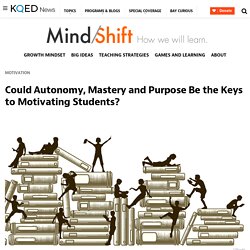

Tax
If you want to change the way people respond to you, change the way you respond to people. If you want me to know who you are, know yourself first.
How to Spark Curiosity in Children Through Embracing Uncertainty. In the classroom, subjects are often presented as settled and complete. Teachers lecture students on the causes of World War I, say, or the nature of matter, as if no further questioning is needed because all the answers have been found. In turn, students regurgitate what they’ve been told, confident they’ve learned all the facts and unaware of the mysteries that remain unexplored. Without insight into the holes in our knowledge, students mistakenly believe that some subjects are closed. They lose humility and curiosity in the face of this conceit. But our collective understanding of any given subject is never complete, according to Jamie Holmes, who has just written a book on the hidden benefits of uncertainty.
He wants students to grapple with uncertainty to spark their curiosity and better prepare them for the “real world,” where answers are seldom clear-cut or permanent. “We’re much more certain about facts than we should be,” Holmes said. Assign projects that provoke uncertainty. Could Autonomy, Mastery and Purpose Be the Keys to Motivating Students? Daniel Pink has studied motivation in the business world for a long time and he’s come to the startling conclusion that traditional ways of motivating employees with financial incentives doesn’t work.

In study after study, social scientists have found that external rewards narrow the focus and restrict possibilities, making it difficult for people to come up with creative solutions to complex problems. The only time incentives worked, in fact, was when the problem was mechanical and the path to the solution was straightforward. Instead, companies around the world have shown that employee motivation increases when people have autonomy, a driving purpose and the desire to perfect their craft. While his TED talk is framed in the language of business, it’s easy to see the parallels in Pink’s argument to schools and learning.
Teachers are preparing students for a world in which the jobs increasingly require problem solving, critical thinking and creativity. Watch Dan Pink lay out his case. What if All they want to do is Play Video Games? “Easy for you to say unschooling works,” someone told me.

“Your kids are interested in academic things. You don’t know my kids. If I unschooled, all my kids would do is play video games all day.” To which I can only laugh. Because, you see, I could spin it two ways. Or I could tell you that all they want to do is play video games. Both versions of the story would be true. Because of the hours and hours and hours and hours, day after day after day after day, month after month after month, year after year after year of video game playing, they naturally became immersed in Japanese things because that’s where Nintendo headquarters is.
Their games sometimes have historical or mythological creatures in them, which gets them curious, resulting in google searches and family conversations. Because of their love of Japan, I got them each a subscription to Japan crate for their birthdays, where they get a box of Japanese goodies each month. The symphonies I mentioned?
ResearchSummary. The Joyful, Illiterate Kindergartners of Finland. Approaching the school’s playground that morning, I watched as an army of 5- and 6-year-old boys patrolled a zigzagging stream behind Niirala Preschool in the city of Kuopio, unfazed by the warm August drizzle.

When I clumsily unhinged the steel gate to the school’s playground, the young children didn’t even lift their eyes from the ground; they just kept dragging and pushing their tiny shovels through the mud. At 9:30 a.m., the boys were called to line up for a daily activity called Morning Circle. (The girls were already inside—having chosen to play boardgames indoors.) They trudged across the yard in their rubber boots, pleading with their teachers to play longer—even though they had already been outside for an hour. As they stood in file, I asked them to describe what they’d been doing on the playground. “Making dams,” sang a chorus of three boys. “Nothing else?” “Nothing else,” they confirmed. “Play is a very efficient way of learning for children,” she told me.
Timothy D. The 13 most innovative schools in the world. 21st Century Education.
Int.